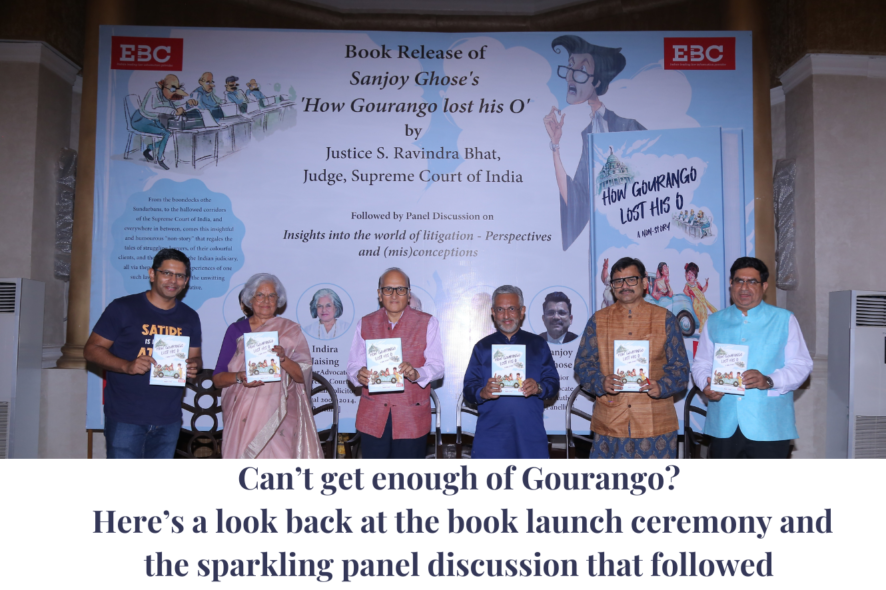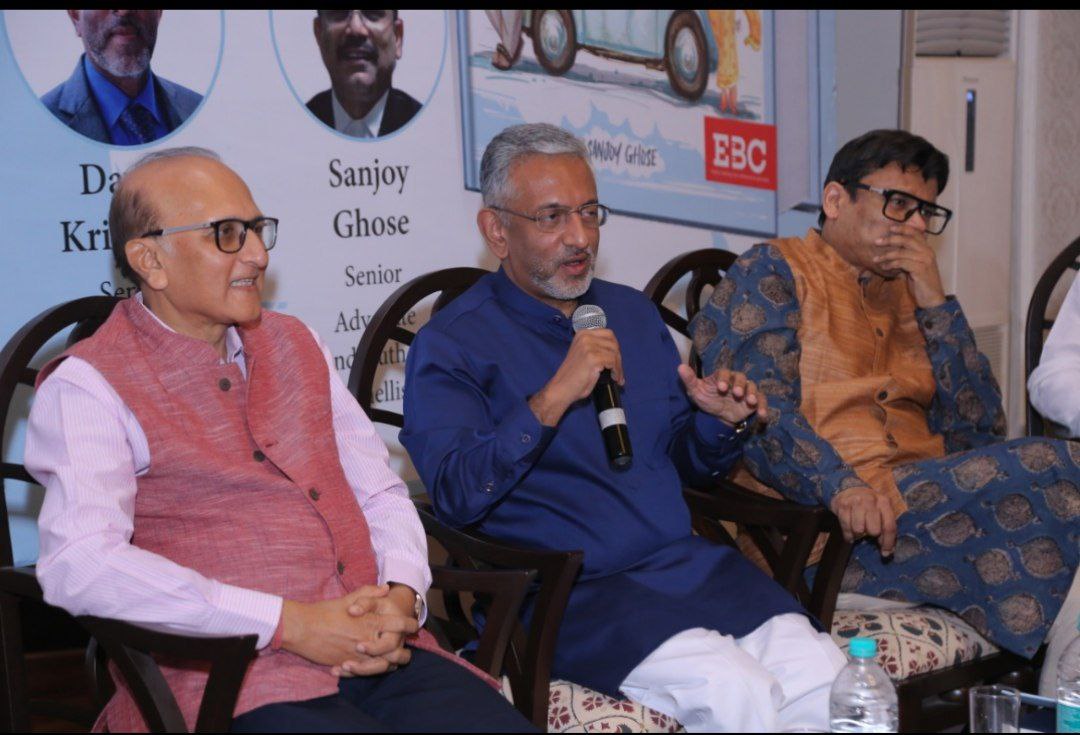Book release
The book launch of Sanjoy’s Ghose’s “How Gourango lost his O” took place on 15th May, 2022 at Bikaner House, New Delhi. This novel, a first of its kind legal fiction in the Indian literature scene, narrates the story of a struggling lawyer and the colourful incidents he faces while navigating through the Indian courtrooms. From clients to court masters to judges, this novel brings forth a never seen before inside look of the working of the Indian legal system. The author of the book is a senior Advocate at the Delhi High Court.
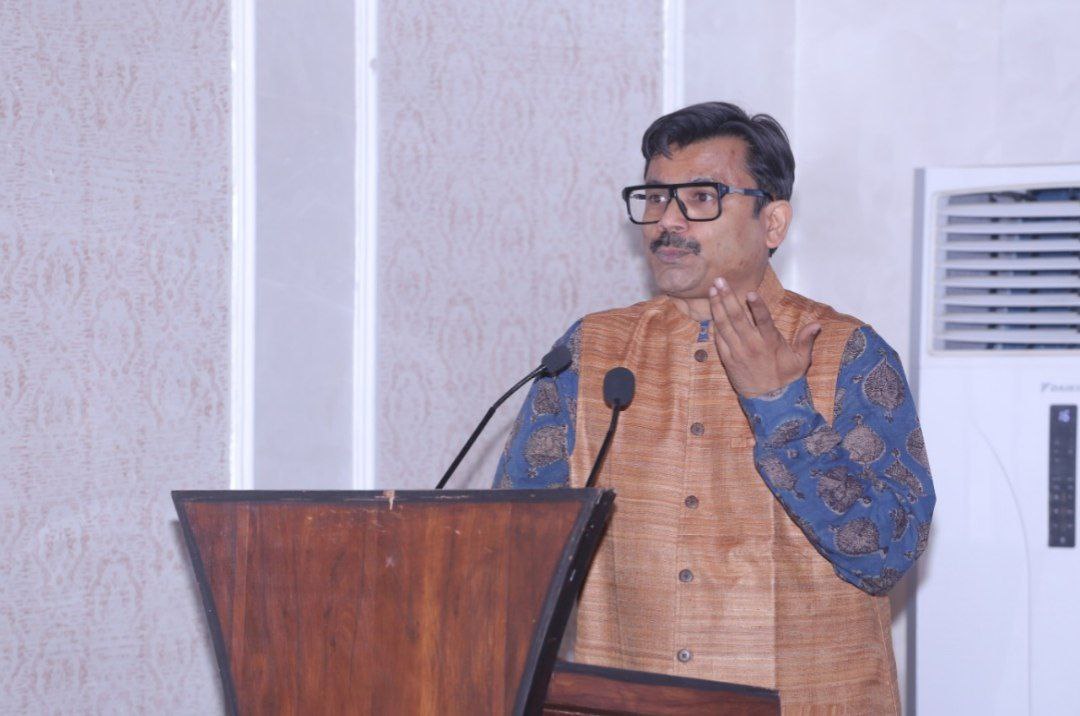
Author Sanjoy Ghose
Book release and publisher’s comments
The book was released by Justice Ravindra Bhat, Judge, Supreme Court of India followed by a panel discussion on “Insights into the world of litigation, perspectives and (mis)conceptions”. The panel included luminaries such as Supreme Court Senior Advocate Indira Jaising and Delhi High Court Senior Advocate Dayan Krishnan, Satirist and Political Commentator, Mr Akash Banerjee and the Chief Guest, Justice Bhat.
The event began with Mr. Sumeet Malik, Director, EBC welcoming the esteemed members of the panel. He mentioned that “How Gourango lost his O” is EBC’s first work of legal fiction and that all the characters of the book are a result of the author’s imagination. He mentioned that the author, Mr Sanjoy Ghose, had been his senior in law school and a mutual friend. About a year and a half ago, Mr Ghose informed him that he had written a fictional autobiography of an imaginary lawyer and sent it across. Mr Malik said that he showed the first draft of the book to his mother, Ms Deepa Malik, as she was the one who instilled the love of reading in him. He got the feedback from her after completing the book she had “a smile on her face and a tear in her eye”. Such a review was enough validation for Gourango to come to life.
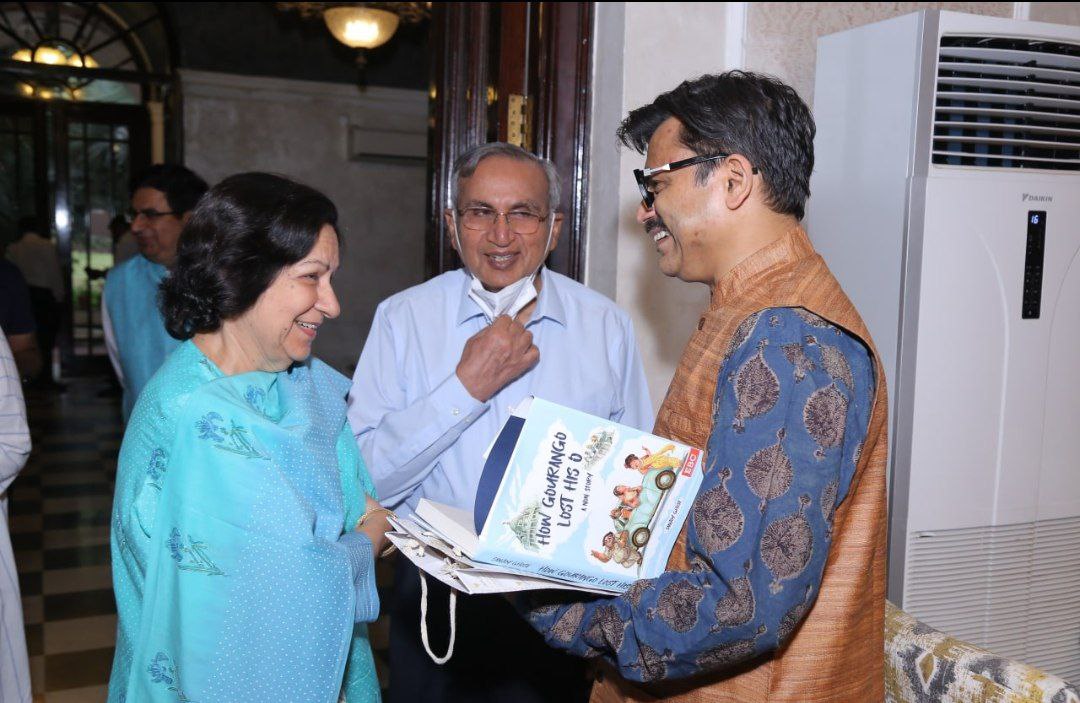
Author Sanjoy Ghose with Mr Surendra Malik, Chief Editor, Supreme Court Cases and Ms Deepa Malik who played an instrumental role in bringing “Gourango” to life
He wished Mr Sanjoy Ghose on the launch of his book said that he hoped that the author would be soon inspired to write another non-story on the success of his first book. He further acknowledged the immense contribution of Ms Supriya Malik and said that his younger sister after a bit of goading put her heart and soul into editing the book and the result is now before everyone. Later he appreciated the organizing committee of the event and thanked Bhumika Indulia, Nilufer Bhateja and Prachi Bharadwaj for all the publicity they gathered for the event.
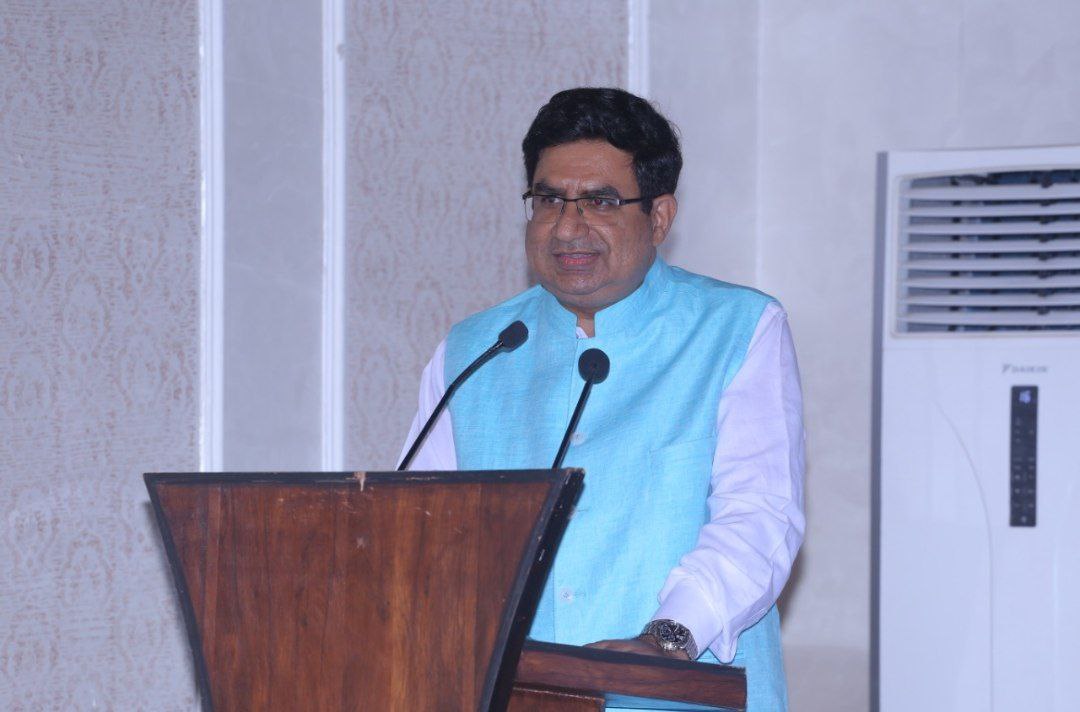
Mr Sumeet Malik, Director, EBC
Justice Bhat’s Speech
After the address by Mr Malik, the book was officially released by Justice Ravindra Bhat and other panelists on the dias. Post the release, Justice Bhat expressed delight on the release of the book and congratulated the author for venturing into a parallel career and a new genre of fiction. He appreciated how the author justifed every character of his non-story by vividly portraying each of them. He added that , “the central protagonist so to speak in a very lose sense, is the litigant Noor whose plight most of us lawyers, perhaps vanishing breed of lawyers known as labor and service lawyers, would be familiar with. Retrofitting of a norm created in terms of qualifications, you create an educational qualification but don’t apply in present but also applies to existing employees, this results in poor Noor’s employment being jeopardized, his whole career is at endangered so to speak.” (sic) He mentioned that contrary to this expectation, the narration and the tone adopted by the author is of empathy and at its worst is gentle irony. He acknowledged that he was surprised as a reader noting how the author has avoided the tone of sarcasm or scorn towards lawyers, judges or situations.
Justice Bhat mentioned that the experiences of the lawyer, while he practiced in Delhi, strung together to form the latter part of the book, is equally absorbing. He recognized that the author had not failed in underlining the utter disconnect between the society we live in and the language of the legal world with its archaic lingo. He observed that the reader of the book can encounter sights, smells, even the taste of the ‘samosas and the chais’ which have a ubiquitous presence in all court complexes.
In his closing remarks, Justice Bhat appreciated the author’s effort in capturing the entire ecosystem of the court and shared his memories of how he witnessed the journey of the author from a bubbly intern to his irrepressible best at the present day.
He added that the sensitivity that he has brought to the fore and portraying the characters he has created speaks volumes about the author himself. He also congratulated the EBC Publications and wished the journal joyful success as a venerable journal that has ventured itself into a legal fiction.
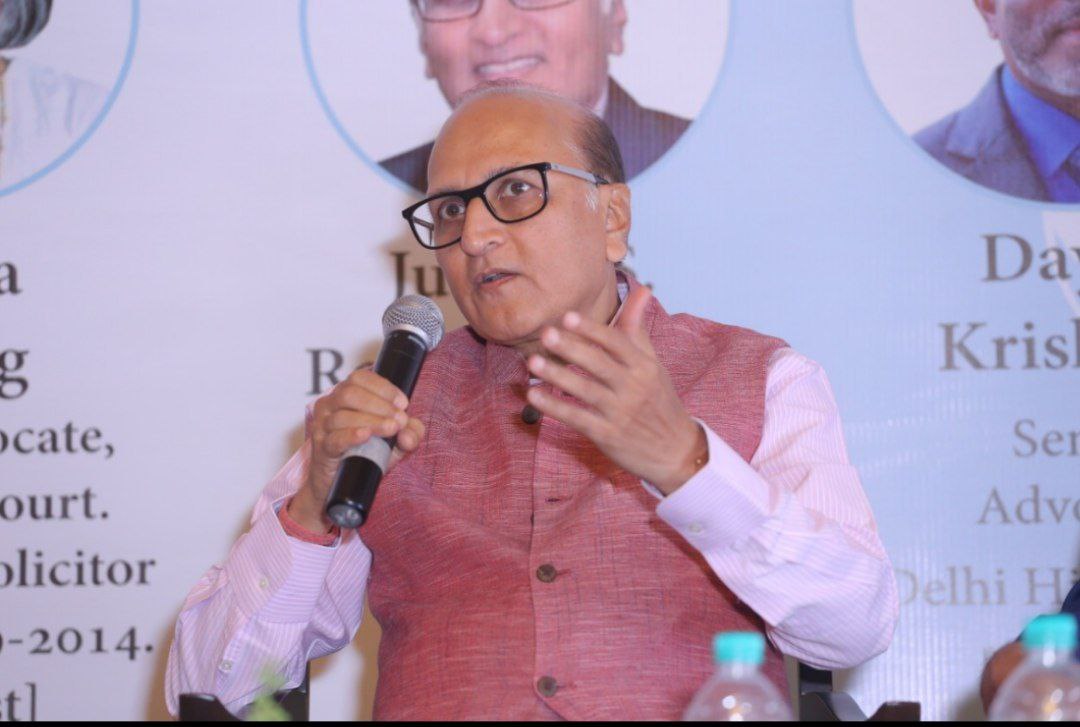
Justice Ravindra Bhat, Judge, Supreme Court
Reading of Excerpts
Next Mr Akash Banerjee read a few excerpts from the book. He observed that the book was a very good primer on how the courts function in the country. He remarked that the chapters of the book are like gems which make the book so much of a valuable read. He further commented that the book gives an insight into how the courtrooms work, the lingo, and other special features which make it a very fascinating read.
Author’s Comments
Celebrating the launch of his book, Mr. Sanjoy Ghosh said, “during covid, the book was kind of tension release for me as I wanted to write something because I found that there was an overdose of webinars and Instagram videos, and I also felt it is time to also give back to the Bar as we have received so much from the Bar” (sic).
He acknowledged the immense support he received from the editor Ms Supriya Malik who was supporting him throughout the whole process, He added, “more than editing, she has done the hand-holding”. He further dedicated the book to every struggling lawyer and emphasized how important it is to acknowledge that the legal ecosystem is the most democratic system to be a part of and one doesn’t need an established family to become a part of this. On a very beautiful note, he ended his speech by saying that the book is a homage to all the women in the bar who are still not recognized as our equals.
Panel Discussion
L to R: Justice Ravindra Bhat, Senior Advocate Dayan Krishnan and Author Sanjoy Ghose
On the question of Live Streaming
Mr Akash Banerjee began the discussion by addressing the elephant in the room, he asked Justice Bhat, whether there are any active conversations in the Judiciary on how the rest of the world perceives the working of the apex court. Justice Bhatt, not speaking on behalf of the judiciary, stated that it is not right to say that the judiciary is not aware of its image. But unlike any other public institution that can come out and clarify whenever there is a controversy, judges are not in a position to do that.
The moderator then asked a follow-up question on courtroom live streaming. He put forth to Justice Bhat that live streaming of court proceedings will dispel public views and misconceptions. In response to that query, Justice Bhat stated that, notwithstanding the lack of uniform live streaming during the COVID-19 outbreak, the courts were as open as any other institution.
Furthermore, Justice Bhat agreed that live broadcasting is necessary and that it has a favorable impact on the lives of people who reside in remote places. He pointed out that the majority of the lawsuits originate from districts and smaller municipalities. However, he added that live broadcasting must be a deliberate policy decision because, in the age of social media, court arguments would be amplified, which may not be constructive.
Miss Jaising, on the other hand, had a different perspective on live broadcasting. She stated that she had approached the Supreme Court over four years ago, seeking that the courts establish guidelines on live broadcasting. The Court had agreed with her, she said and declared that live broadcasting is protected under the fundamental right to know.
She went on to say that live streaming will benefit law students and would aid in the prevention of misinformation. However, Ms Jaising stated that the court had failed to implement the verdict. In response to the topic of whether the Supreme Court has lost respect as a result of perceived mis(conceptions), she stated, “The judgment on live streaming was supposed to come into effect immediately. But it’s been four years and yet the Supreme Court has not implemented guidelines on it. If the Supreme Court cannot implement its order, how will it gather respect?”

Panellists gearing up for discussion
On making it big as an Advocate
Mr Banerjee posted the next question to Advocate Dayan Krishnan, that whether there is a motive of money in bulk behind the active participation of young lawyers in the field of law these days. In response to this, Advocate Krishnan stated that things have changed over the last 25 years but money can never be the motivation in the profession, a person has to be patient and rather more inclined towards learning at the end of the day. On the question that how the tag of a good law school matters, Mr. Krishnan, stated, “it certainly matters but it matters at the day you enter the gates of the profession, after that it doesn’t”. He added that there can be several excellent students who cannot manage to get admission through CLAT as it is just a game of numbers now. Law School matters for the kind of foundation one gets but if someone is willing to put in the efforts for the art and willing to do the hard work then sky’s the limit.
On perceptions about Legal Profession
Next question was for Mr. Sanjay Ghosh who in answering the question on what is the one ridiculous perception about the legal profession that irritates him the most, stated that there was a time when the parents would have a heart attack on hearing that their child is aiming to become a lawyer but now the time has changed and the parents are themselves encouraging their children to get into the profession of law. He further had a very humorous take on how the law is no more an incestuous world and how anyone can make big in this profession without the backing from any godfathers, he said, “other than making fun of my bong dialect, I have never faced any kind of discrimination in the Delhi High Court, and that’s a matter of pride for me”
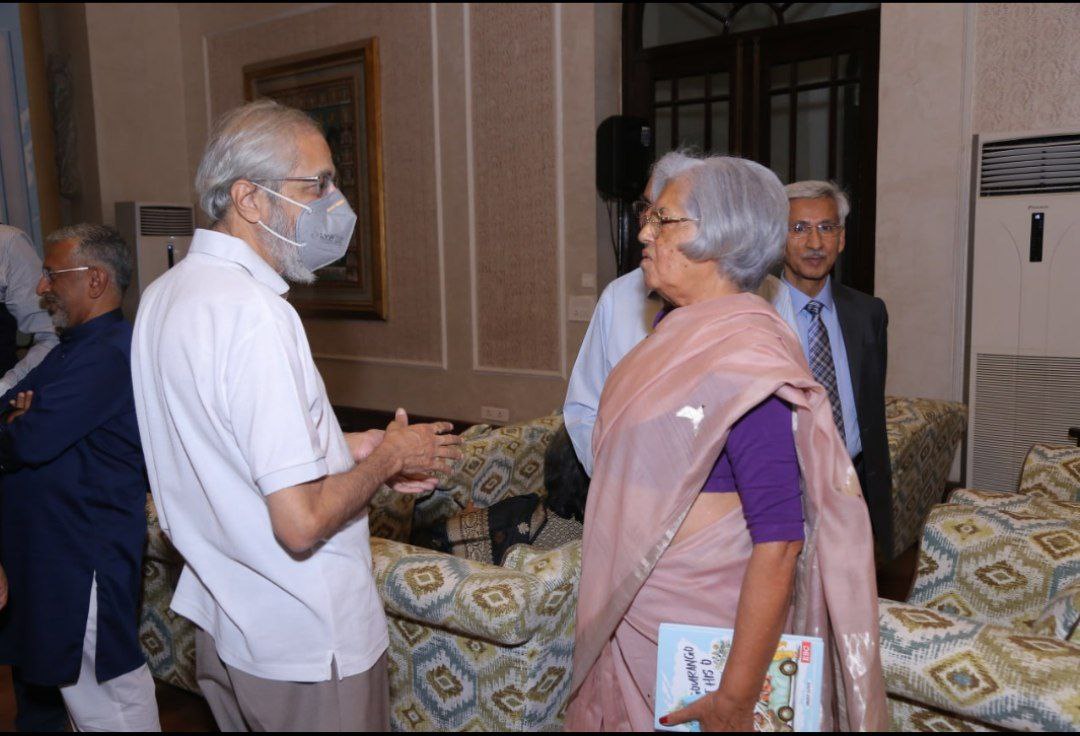
Senior Advocate Indira Jaising in deep conversation Justice Madan Lokur
On frivolous PILs
Mr Banerjee then requested Justice Bhat to address the issue of frivolous PILs, citing a recent, now-dismissed PIL filed in the Allahabad High Court to open the 22 shut doors of Taj Mahal. He requested Justice Bhat to look into whether such petitions could be dealt with by imposing some sort of penalty for squandering valuable court time.
Justice Bhat replied by stating that there are some things you just have to live with since the system would suffer if you try to change it. He pointed out that the Supreme Court has attempted to streamline the PIL mechanism through its decisions. However, extra caution must be exercised in this situation. In this sense, the Supreme Court and the High Courts have the widest jurisdiction. He realized that you can’t bind it down with regulations. He further said, “There can be certain kinds of principles which evolve through judgments. But if you try to legislate it through rules, you will be constraining it. Therefore, the call must be taken by the judges. You cannot legislate away a class of litigation that is generally meant for the public. “
On Sedition Law
The moderator then inquired about Justice Bhat’s thoughts on misuse of the Sedition Law. Justice Bhat in response to the statement acknowledges that being a part of society, we are the engineers of the system prevailing in the present. On the other hand, he avoided making any political statements. However, he did state that liberty is never free and that we, as a society, must solve this problem.
Ms Jaising, on the other hand, gave her personal position on the issue of sedition. She expressed her dislike for the term “misuse” in the context of sedition law. She further clarified her position and said, “We have to understand this concept that the misuse of the law in itself does not make it unconstitutional. What I am saying is that the law is being used in the manner that law enforcement wants to use it. The use of the law has been elevated to the level of policy. It has become a policy of the abuse of process that we are witnessing in the country today.”
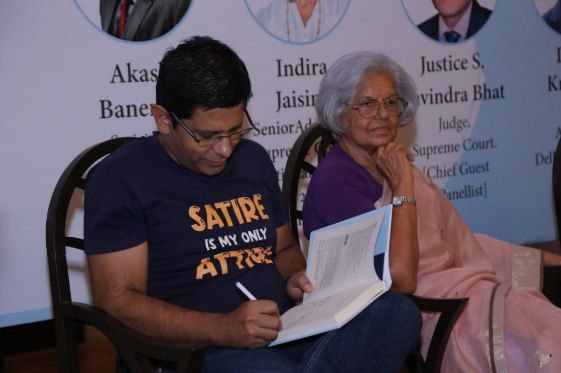
Political Commentator Akash Banerjee and Senior Advocate Indira Jaising
Optimism about the future
Ms Jaising also discussed the current state of institutions and the aspirations people have for the legal profession in the future. She remarked, “Battles of the future will be fought in the courts. Lawyers will have to rise to the occasion and take these matters to the court of law. Courts are going to be very important institutions in the future. It will depend on the courts whether we want to break or un-break an undemocratic system”.
Widening of Jurisprudence
While responding to queries made by the Moderator Akash Banerjee on several contemporary issues, Mr. Malik gave insight into the evolution of Jurisprudence with respect to Article 21. He said that “If you want to look at how the jurisprudence has evolved from 1950 to date, that scope of Article 21 which by definition included procedure established by law now takes into account due process as well. Scope of Article 21 has been widened not just in terms of a person’s life and liberty but it has changed to so many aspects of our life and liberty for eg. Puttaswamy judgment has made Right to Privacy a fundamental right.
Bringing a change to society
Interestingly, the last topic of the conversation was about lawyers who have gone on to become judges. Justice Bhat spoke about his own experience as an advocate, saying thagreeted by penniless clients when he first started his job. But it was his passion for the job that kept him going, and things did eventually improve. What motivated him to take judgeship was the ability to make a difference. He said. “As lawyers, you make a difference in two to three cases. But as judges, you will certainly make a difference in six to seven cases”, he added. That was what made him say yes to the judgeship, he concluded.
The full video of the book launch and panel discussion can be seen here
A copy of the book can be bought here: https://www.ebcwebstore.com/product_info.php?products_id=99101340



